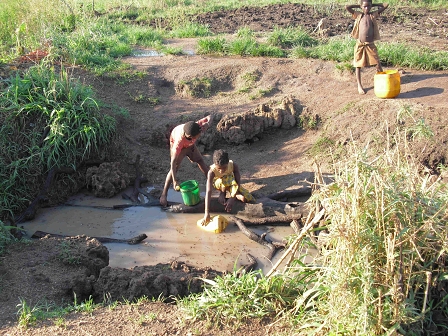Erstellt am: 22. 12. 2016 - 01:00 Uhr
FM4 Intelligentkalendar #22: The WADI
Der FM4 Intelligentkalender
24 Ideen zur Rettung der Welt.
- zurückblättern: #20: Der Solarchill Kühlschrank
We want to go to Mars and find a cure for cancer. And we should plan to do all that – that would all be great. But there are simpler things we haven’t managed yet.
For example we need to work on guaranteeing access to something as basic as clean drinking water. An astonishing 80 per cent of disease and death in the developing world is related to dirty water.

Helioz
This has a huge impact on the resources of poor countries: 50 per cent of their hospital beds are occupied by people suffering from waterborne diseases such as diarrhoea, cholera and typhus.
Most shockingly of all, I find, is the fact that more children die in the global south due to dirty water than are killed by HIV/AIDS, Malaria and measles combined.
Fighting the problem is a major drain on the pockets of individual families, explains Martin Wesian, a social entrepreneur from Vorarlberg. And that’s why he has developed a simple solar powered device called the WADI that can give families or schools the confidence that the water they are drinking is not going to harm them.

Helioz
The WADI is an oblong plastic and metal contraption that is light and fits on the palm of your hand. Having gained World Health Organisation for its power to detect microbiological changes in water, the WADI is currently saving lives in the Philippines, Kenya, Uganda, Ethiopia, Ghana, Mali and India.
The Purifying Power Of The Sun
Let me explain how it works: If you don’t have access to naturally safe water, as 660 million people in Africa, Asia and Latin America don’t, then you can purify it by laying bottles or containers of water in the rays of sun; an easily accessible commodity in the hot countries of the global south.
Most people use plastic PET bottles which are readily available and cheap. Over time the ultraviolet solar rays kill harmful bacteria and viruses in the bottles of water, making your formerly dirty water safe for consumption.

Helioz
The challenge has always been guessing how long the water has to lie in the sun before it is safe; and false guesswork can be deadly.
The WADI fits over the neck of a PET bottle and measures the exposure of the water of solar radiation. You know that 99.99% of the bacteria in water are removed and it is safe for drinking, once the display of the gadget shows a friendly smiling face.
“We used the smile because many of the users are illiterate,” explains Martin, who learned the pitfalls of dirty water at first hand when he contracted cholera when backpacking in Venezuela.“We thought about green and red signs but then found out that in some cultures red could mean good. But everyone everywhere understands the significance of a smiley face.”
Guessing Can Be Deadly
To give you some example of how difficult it is to guesstimate the safety of water: on hot days near the equator it can take just 45 minutes for the sun to destroy all pathogens but in other areas, with cloud cover, the water may still be unsafe for up to two days.
The most important aspects for Martin were to develop a product that was robust – he invites me to thrust the WADI across the room, which I do nervously – and simple. There’s no need for replacement parts and if it breaks within two years you get a new one. It’s also environmentally friendly, says Martin, with no batteries, no chemicals and no CO2 emissions.

Helioz
"You value what you purchase"
It’s also affordable. Martin’s company Helioz sells units at around €15 in the developing world and he prefers them to be sold than handed out for free by NGOs.
“If you purchase something, it is valued. That is an important principle in the developing world.”
€15 is still an investment. Martin says his customers are typically in communities where a typical wage is $2.50 per day, but Martin argues it cuts the costs of chemical forms of water purification.
To reduce the financial burden, sometimes whole communities share a WADI. Elsewhere micro-entrepreneurs have been using WADIs as ways of selling water that is verifiably clean to others in the community, creating extra sources of income.
Keeping Kids In School
Martin has been most excited by its impact on school attendance. Fewer waterborne illnesses means fewer missed days at school. In some areas where the WADI is in use, he claims, school attendance has shot up by 40%.
Eventually Martin hopes that the WADI will be produced in a developing country, creating employment for locals. That was the original plan and Helioz has tried to produce the product in India. But with this new product, quality control remains the major priority, particularly in light of the year guarantee offered to customers. Martin has made 50 trips to the factory in Upper Austria where the WADI is produced; a level of oversight that would be impossible if the factory were on another continent.
For the time the WADI gadget is designed and produced in Austria providing healthy safe water and doing it with a smile.


